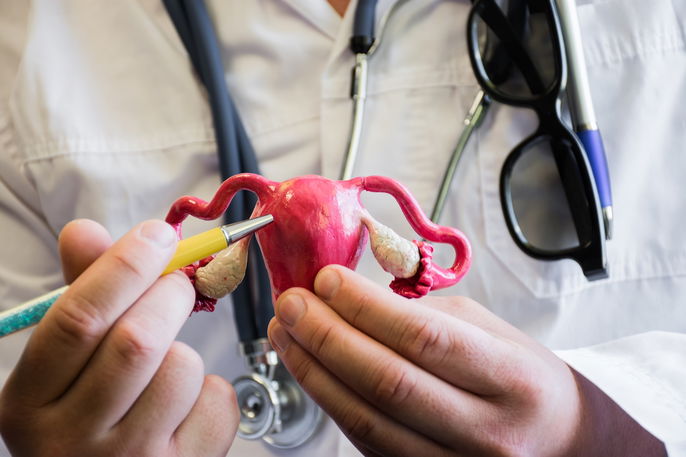An retroverted uterus refers to a uterus that is tilted backwards toward the spine, and not forward toward the bladder. Women with a retroverted uterus are also likely to have ovaries and fallopian tubes that face backwards. This condition can also be referred to as a tilted terus.
Despite this being an abnormal anatomical finding, it does not interfere with a woman's fertility nor does it prevent pregnancy. In most cases, a retroverted uterus does not cause any signs or symptoms, and is only identified during a routine ultrasound or pap smear.
Nonetheless, some women may report pain when urinating, pooping or after intimate contact. In these cases, the doctor may recommend a surgical procedure to reposition the uterus is turned forward to reduce symptoms.

Common symptoms
Women with a retroverted uterus may report symptoms like:
- Pain in the hip region
- Severe cramps before and during menstruation
- Pain during and after sex
- Pain during urination or bowel movements
- Difficulty using tampons
- A sensation of pressure in the bladder
However, the majority of women with a retroverted uterus do not experience symptoms and this condition is normally only identified during a routine exam. Women who do not have any symptoms usually do not require treatment.
Confirming a diagnosis
A retroverted uterus is typically discovered by the doctor during a gynecological examination. The doctor is able to palpate the location of the cervix and uterus and identify that it is tilted backward toward the spine, instead of forward.
Imaging tests, like a pelvic or transvaginal ultrasound, may also be ordered, to confirm this finding.
Possible causes
The main causes of a retroverted uterus are:
- Endometriosis
- Pregnancy
- Uterine adhesions
- Fibromas
- Menopause
Some people can also be born with a retroverted uterus without it being associated with any health problems.
Retroverted uterus and pregnancy
A retroverted uterus does not cause infertility and nor does it interfere with fertilization or a healthy pregnancy. However, during pregnancy, a retroverted uterus can cause incontinence, back pain and pain with urination or a bowel movement.
Furthermore, labor with a retroverted uterus can be normal, and a cesarean section is not necessary for this reason alone. In most cases, up until the 12th week of pregnancy, the uterus adapts to a more normal position and faces forward under the bladder, which can facilitate a normal birth.
Cases of a retroverted uterus with difficulty getting pregnant may be more related to another health condition, like endometriosis or fibroids.
Treatment options
Treatment for a retroverted uterus should be guided by a gynecologist, who may recommend hormonal therapy if this condition also presents with endometriosis. Laparoscopic surgery may be recommended to reposition the uterus over the bladder in cases that present with symptoms, while more severe cases may require surgical removal of a uterus (also referred to as a hysterectomy).
Another treatment option involves the placement of a small silicone pessary to keep the uterus tilted forward, as well as its manual repositioning by the doctor. If the position is maintained, the doctor may recommend performing Kegel exercises to strengthen the pelvic floor.






























